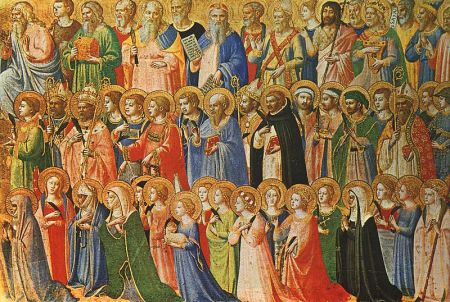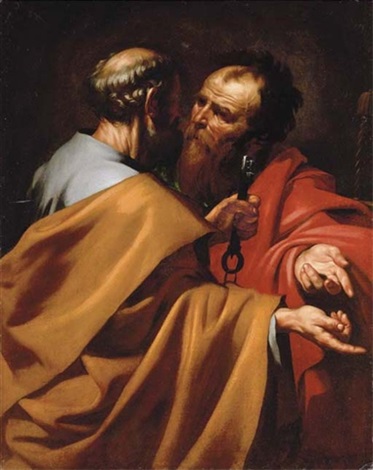5th Sunday in Ordinary Time

In our first reading, we hear the deep discouragement of Job:
“Is not man’s life on earth a drudgery?
…I have been assigned months of misery…
…My days… they come to an end without hope.
…I shall not see happiness again.”
If you are familiar with Job’s story you know he says these words during a very dark time in his life. Though innocent, he is in the midst of an extended trial, with emotional suffering, physical pain, loss, and loneliness. His words, like all the words of Scripture, are offered for our benefit — thanks be to God. And indeed, the Book of Job has lessons to teach us in our hard times.
One thing we learn from Job is that we can be real and honest with God. By the end of the book, Job is shown that God’s vast creations, plans, and purposes are beyond Job’s comprehension, for “Great is our Lord and mighty in power; to his wisdom there is no limit,” yet the Lord does not condemn Job for his questioning. In fact, God has Job intercede on behalf of his friends who had argued Job’s sufferings must be on account of his own sins. God has Job pray for them that they may be forgiven their error. The number of plaintive psalms that God inspired and made sure were included in Sacred Scripture suggests that he wants us to bring our complaints to him. The very name of God’s people “Israel” means “He who wrestles with God,” and you cannot wrestle with someone without drawing close to them.
The Lord wants us to be honest with him because that is the real us and the kind of relating that will actually help us. If you wear a disguise in God’s presence, it won’t fool him and it won’t help you. In spiritually directing others and in studying myself, I have noticed that when we are avoiding times of prayer or finding our prayer times very dry, it is often because we are avoiding relating something to the Lord. There’s something we don’t want to look at or talk about with him. Imagine if you had a good doctor, indeed the very best doctor – would it be wise to find excuses to miss your appointments or lie to your physician about how you were feeling? Reveal your wounds and symptoms to the Divine Physician that you may be healed. As today’s psalm says, “He heals the brokenhearted and binds up their wounds.” Today’s gospel tells us, “Rising very early before dawn, [Jesus] left and went off to a deserted place, where he prayed.” If making time for daily personal prayer was a top priority for Jesus, how much more important must it be for us?
A second thing we learn from Job is that God is with us in our struggle and that the struggle is worth it. Though Job did not understand why he suffered, God was never far from him. God was proud of Job and praised him, “There is no one on earth like him, blameless and upright, fearing God and avoiding evil,” and through his trials and sufferings God made him greater still. Other Christians sometimes ask why we have crucifixes on our walls rather than a bare cross. “Christ is risen,” they remind us, “so why depict him as still suffering on the Cross?” In his post-Ascension appearance to one of the Church’s early persecutors, Jesus said, “Saul, Saul, why are you persecuting me?” When asked by Saul, “Who are you, sir?” the reply came, “I am Jesus, whom you are persecuting.” If you are a suffering member of Christ’s body then know that you do not suffer alone. This Saul is better known to us as St. Paul. When St. Ananias hesitated to visit him and heal his blindness, the Lord insisted, “Go, for this man is a chosen instrument of mine to carry my name before Gentiles, kings, and Israelites, and I will show him what he will have to suffer for my name.” St. Paul writes in today’s second reading that his life’s mission, the preaching of the gospel, was an obligation imposed upon him. He could either see this as a hard burden to grumble over, or as an opportunity to rejoice in, and thereby gain reward. St. Paul knew God’s purpose for his life and embraced it to great benefit.
Dr. Viktor Frankl was a Austrian-Jewish doctor who was deported to a Nazi concentration camp during the Second World War. After his liberation, Frankl wrote about what he observed and discovered about human nature during that terrible ordeal in his famous book “Man’s Search for Meaning.” Frankl says, “Life is never made unbearable by circumstances, but only by lack of meaning and purpose.” He says, “Nothing is [more] likely to help a person overcome or endure troubles than the consciousness of having a task [a purpose] in life.” So many people, believing that our existence in this universe is an accident and disbelieving that life has any objective purpose, grope through life striving to generate their own meaning and purpose. But you know you are not here by accident. “[The Lord] tells the number of the stars; he calls each by name.” Each one is in their place according to his purpose and so are you. Who made you? God made you. Why did God make you? He made you to know Him, love Him, and serve Him in this world, and to be happy with Him for ever in the next. But even Christians sometimes wonder, “Does what I’m doing really matter? Is my life important? Are my struggles really worth it?” They think to themselves, “If I wasn’t here, I’d be replaced by someone else.” Perhaps, but that’s not the right way to frame your thought. What if you disappeared from your home, your job, your community, and no one came to fill your void? Consider all the good things that would go undone. That is your contribution to our world and those around you. And God has eternal purposes for you that extend beyond this life and world.
A third and final thing we learn from Job is that things are not so hopeless as they may seem and there are better things to come. The way that we happen to feel in any particular moment does not necessarily reflect reality. One afternoon when I was a seminarian, I was in my dorm room and had homework to do, but I was fed up with it, I had no motivation, and decided to give up and to go to bed. When I woke up three hours later, the world was transformed, brighter. I was happier, eager to work, and even the view outside my window seemed better. Of course, it wasn’t the world that changed but me. I was exhausted and I didn’t know it and this was coloring my perceptions. You are an union of body and spirit. You need sleep, and food, and personal connection. Self-care is important, so love yourself as well as your neighbor. If someone is diabetic, we do not tell them to just buckle down and change their attitude. They need insulin to be healthy. Sometimes people suffer chemical imbalances in their brains, often hereditary in origin, which burden their experience of life. We live in an age of wonders with remarkable medicines and we should be unashamed to seek help. As the 38th chapter of Sirach teaches: “Make friends with the doctor, for he is essential to you; God has also established him in his profession. From God the doctor has wisdom… Through which the doctor eases pain, and the druggist prepares his medicines.” Sirach explains that a good doctor is one of God’s instruments in doing his work on earth.
The story of Job shows us things are not so hopeless as they may seem – there are better things to come. We heard Job’s lament, “I shall not see happiness again,” but he was mistaken. Job’s lot got better. Much better. God restored the prosperity of Job and even gave him twice as much as he had before. Then all of his brothers and sisters came to him, and all his former acquaintances, and they dined with him in his house. They consoled him and comforted him and gave him gifts. Job would see his children, his grandchildren, and even his great-grandchildren in fullness of years. Thus the Lord blessed the latter days of Job more than his former ones. But what if the remaining years of my life do not get better? What if each new year becomes harder than the last? What if I have a stroke, or a heart attack, or terminal cancer and I am dead in six months? How can better times still be waiting for me? Are you not promised Heaven where you will experience the restoration, fellowship, and consoling joys Job knew? Then, in the end, as St. Julian of Norwich said, “All shall be well, and all shall be well, and all manner of thing shall be well.”
So remember that you can be completely real and honest with God, he invites this. Remember that the Lord is with you in your struggles and that these struggles are worth it. And remember that things are not so hopeless as they may seem, for with Jesus Christ there are surely better things to come.















